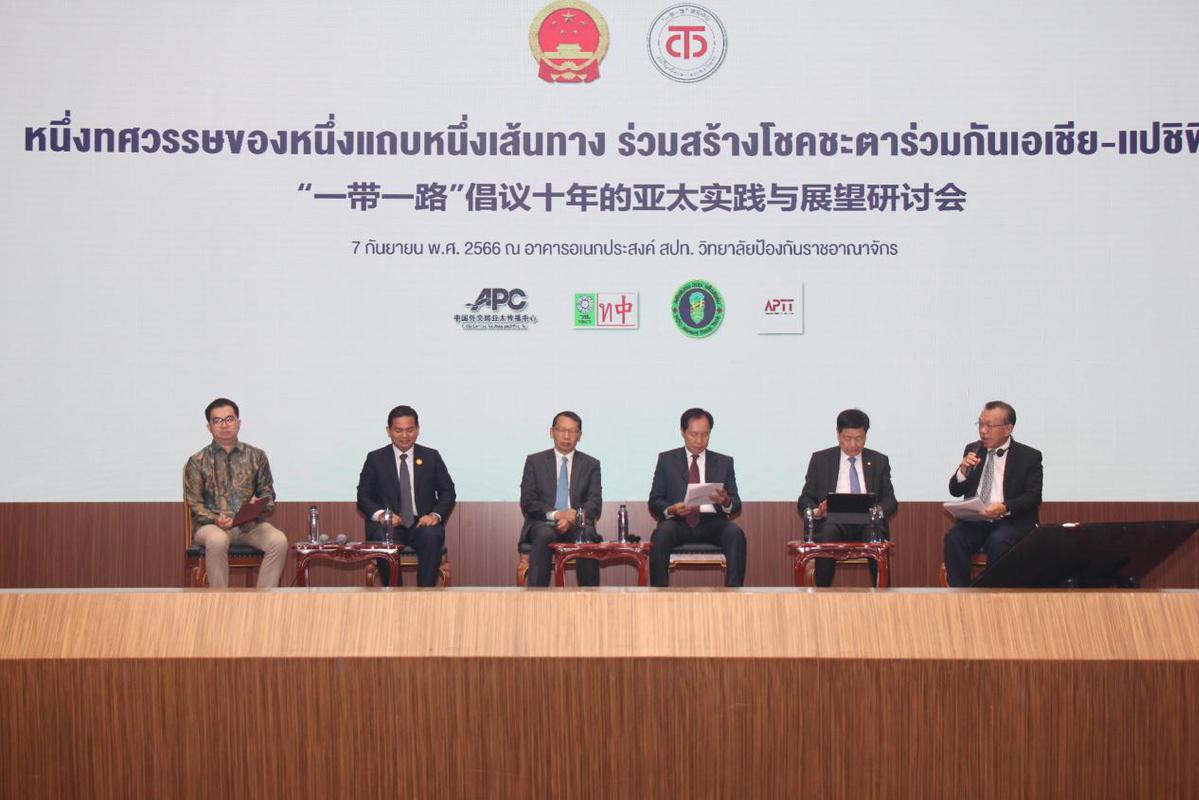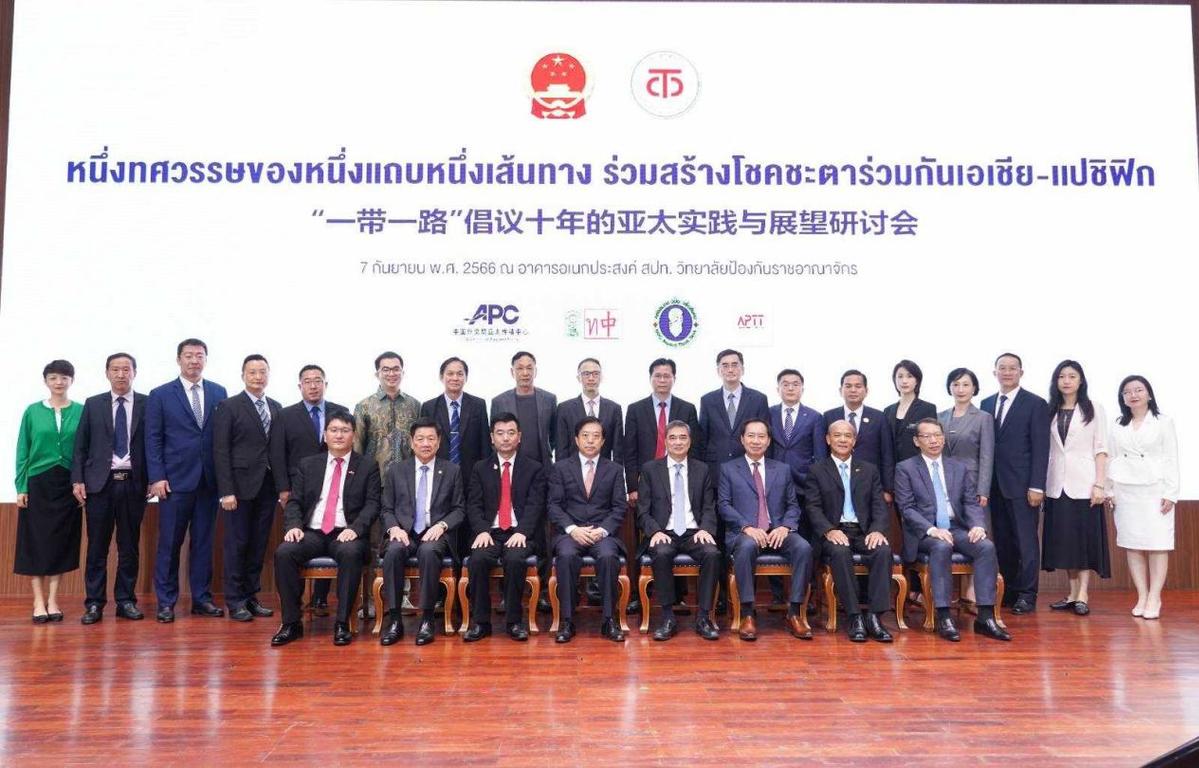BRI serves as platform for global opportunities of joint development: Forum


The Belt and Road Initiative has created opportunities for Asia-Pacific region's development, benefiting people not only in the region but also the whole world, and it will continue to serve as a platform for deepening cross-border cooperation, officials and experts said.
"The initiative is an important diplomatic move proposed by Chinese President Xi Jinping in 2013 and we've seen a lot of benefits it has brought to the Asia-Pacific region as well as the rest of the world over the past decade," Abhisit Vejjajiva, former Thai deputy prime minister said during a forum.
About 200 officials, scholars and experts participated the forum themed -the Asia-Pacific Practices and Outlook for the 10th Anniversary of Belt and Road Initiative held in Bangkok on Thursday.
Abhisit said the initiative is a crucial booster to the regional economic growth. "Over the past 10 years, China has made significant achievements in several aspects, such as economy, poverty alleviation and high-tech innovation, of which many are miracles that impressed the world," he added.
The Belt and Road Initiative is another contribution that China has made to the world, he said. Under the initiative, many infrastructure construction projects have enhanced people's livelihood and boosted cross-border trade and people-to-people communication.
"We are now facing a changing world with risks and challenges. The initiative provides us a historical chance of fighting for a brighter future in the next few years, with China leading many countries to seek a peaceful development road and a win-win result," Abhisit said.
He also called for countries involved in the initiative to play their responsibilities, giving feedback and supports in needs and making it a strategy with richer and diversified content.
Abhisit said Thailand should speed up the construction of the China-Lao-Thailand high-speed railway's section within the country, seizing the great opportunity of the initiative and achieve high-quality sustainable development.
Over the past decade, 152 countries and 32 international organizations have signed up to the Initiative, according to Beijing authorities.
ASEAN and its member states have been important Belt and Road partners since 2013, and the sheer number of projects completed and under construction under the initiative's framework shows the benefits have been mutual.
Thailand, Cambodia and Vietnam are partnering in the Belt and Road Initiative in various ways including the building of railways and highways. Singapore's status is vital for the initiative, especially in investment, environmental protection, finance and legal services. In Myanmar, Belt and Road projects including high-speed railways, highways and dams were launched in 2021.
Yukio Hatoyama, former Japanese prime minister, said the BRI has pushed the world to address livelihood problems in developing countries at the global sphere, and promoted regional stability and progress in the Asia-Pacific region. Bhokin Bhalakula, former House Speaker, noted that Thai-China cooperation is embracing a high-quality era and the BRI and building shared future of mankind met with the aspirations of peoples in related countries.
"The Belt and Road Initiative has been practised with an aim of seeking common interests between China and the world. It serves a role in guiding and advancing cross-border relations while creating a new, open and inclusive system for development," said Chinese Ambassador Han Zhiqiang.

A round table talk on how the Belt and Road Initiative influenced the Asia-Pacific region is held during a forum themed Asia-Pacific Practices and Outlook for the 10th Anniversary of Belt and Road Initiative held in Bangkok on Thursday. [Photo provided to China Daily]
Han emphasized that the initiative conveys the spirit of cooperation and is a practice of pursuing a win-win development for a shared future of human beings.
"China is a contributor to world peace and a defender of international order. We'd always like to promote a common prosperity and a community with a shared future for mankind," Han noted.
The friendship between Thailand and China, as highlighted by Han, demonstrates the potential for the Initiative to foster bilateral relations between the two countries. According to Han, the second phase of China-Lao-Thailand railway's Thai section is set to start in 2024.
Once completed, the state-of-the-art rail system will boost economic development in the region and significantly reduce the cost of transporting goods between Thailand, Laos and China.
"Those projects under the initiative ensured the interconnection between countries involved. The initiative also inspired ASEAN countries with another option to achieve future development," said Wirun Phichaiwongphakdee, director of the Thailand-China Research Center of the Belt and Road Initiative.
"The building of closer regional industrial and supply chains is a very important aspect of Asia-Pacific cooperation, which will help the region cope with risks and ensure stability and prosperity," he said.
By focusing on shared goals and sustainability, Wirun said China and Thailand will continue to deepen the bilateral ties to cope with the global challenges. "Thailand and China will see an even stronger partnership in the years to come."

































